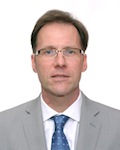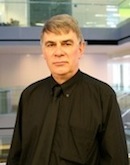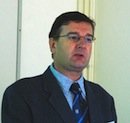Keynote Speakers
We are very pleased to have acquired the services of an excellent selection of keynote speakers for the conference. It is our aspiration that these speakers will give our delegates a view about technological and scientific activities, relating to sustainability in energy and buildings, taking place in various areas of the world.
The speakers and the titles of their talks are shown below.
Note that the list is incomplete at the moment and other speakers will be added over time.
Professor Raimund Bleischwitz
University College London, UKThe Role of Resource Efficiency for Sustainable Construction
More details ...
Professor Raymond Cole
University of British Columbia, CanadaShifting Performance Expectations: Net Positive and Regenerative
More details ...
Dr Jarmila Davies
Welsh Government, UKIs knowledge sharing a sustainable concept in the increasingly constrained economic context?
More details ...
Adrian Leaman
Building Use Studies / Usable Buildings Trust, UKThe Responsible Retrofit Guidance Wheel: accessible research results for everyone
More details ...
Dr Marco Perino
Politecnico di Torino, ItalyThe building envelope: a future beyond the concept of thermal insulation
More details ...
Other speaker's details to follow ...
Professor Raimund Bleischwitz
University College London, UKThe Role of Resource Efficiency for Sustainable Construction
Abstract:
The contribution looks at resource efficiency from both an environmental and socio-economic perspective. It deals with environmental concepts such as the 'planetary boundaries' and land use changes from the recent UNEP IRP report as well as with development perspectives for resource-rich countries. It articulates a vision where less primary materials are being used in the 2nd half of the 21 century, however with strong features of a circular economy for non-renewable resources and extraction pathways for a number of countries. While resource efficiency and eco-innovation feature high on such agenda, there is also a scope for policies. The contribution reflects on the need to overcome barriers and elaborates on policy pillars with a particular focus on the EU. Those policy pillars stem from the resource efficiency roadmap and ongoing discussions in a number of EU projects as well as from other observations; they cover economic incentives and legal mechanisms.

Biography:
Raimund Bleischwitz has joined University College London (UCL ISR) as BHP Billiton Chair in Sustainable Global Resources in August 2013; at UCL he'll establish the new Institute for Sus-tainable Resources with Paul Ekins.
He was previously Co-Director on 'Material Flows and Resource Management' at the Wup-pertal Institute in Germany, and has been Visiting Professor at the College of Europe in Bruges, Belgium since 2003.
An economist by training (PhD, ,Habilitation'), he has more than twenty years experience in research on environmental and resource economics, resource efficiency, incentive systems and policies, raw material conflicts, industry and sustainability. Raimund spent fellowships at Johns Hopkins University (AICGS) and at the Transatlantic Academy (TA), both in Washington DC, and in Japan.
Raimund has more than 230 publications, inter alia the report on The Global Resource Nexus (with five fellows from the TA), and the books International Economics of Resource Efficiency. Eco-Innovation Policies for a Green Economy (Springer Publisher 2011), Sustainable Resource Management. Trends, Visions and Policies for Europe and the World (Greenleaf Publisher 2009), Sustainable Growth and Resource Productivity - Economic and Global Policy Issues (Greenleaf Publisher 2009), Corporate Governance of Sustainability: A Co-Evolutionary View on Resource Management (Edward Elgar Publisher 2007), Eco-Efficiency, Regulation, and Sustainable Business. Towards a Governance Structure for Sustainable Development (Edward Elgar Publisher 2004).
Contact:
Professor Raymond Cole
University of British Columbia, CanadaShifting Performance Expectations: Net Positive and Regenerative
Abstract:
Two key significant shifts in thinking have occurred over the past decade that have begun to reframe building environmental performance. First, whereas "net zero" has become an increasingly explicit performance goal and increasingly embedded in national energy policies, the emerging notion of "net positive" buildings which, if considered as more than simply the generation of more exporting energy versus its importation to individual buildings or the grid, shifts the emphasis to the maximization of energy performance in a system-based approach. Second, whereas green building strategies, performance goals, and associated assessment methods emphasize the ways and extent that buildings should mitigate global and local resource depletion and environmental degradation, the emerging notion of 'regenerative' design emphasizes a co-evolutionary, partnered relationship between humans and the natural environment, rather than a managerial one that builds, rather than diminishes, social and natural capital.
This presentation evaluates regenerative design, net positive approaches and the resulting consequences of viewing the role of a building in adding value to its context and systems in which it is part. Such a shift opens a host of new technical, behavioural, policy and regulatory issues and opportunities not currently evident with green building and net zero approaches.

Biography:
Dr Ray Cole is Professor and former Director of the School of Architecture and Landscape Architecture, where he has been teaching environmental issues in building design for more than 35 years. His current research interests relate to regenerative design, building environmental performance assessment, and human and automated intelligence.
Ray was selected as a North American Association of Collegiate Schools of Architecture Distinguished Professor for "sustained commitment to building environmental research and teaching" in 2001. In 2003 he received the US Green Building Council's Green Public Service Leadership Award. Ray was the recipient of the 2008 Sustainable Buildings Canada Life-Time Achievement Award and the 2009 Canada Green Building Council's Life-Time Leadership Award. He is a past Director member of the Canadian Green Building Council, an honorary member of the Architectural Institute of BC, Fellow of the Royal Architectural Institute of Canada and holds the UBC designation of Distinguished University Scholar.
Dr Jarmila Davies
Welsh Government, UKIs knowledge sharing a sustainable concept in the increasingly constrained economic context?
Abstract:
Collaborative R&D plays significant role in stimulating enterprise and innovation in both academic and business sectors. Open innovation concept encourages this activity, however in many cases diverse cultures of both sectors make it difficult to form successful partnership. The importance of generating new knowledge has been recognized by many generations as engine for growth and prosperity and Government policy underpinned by associated funding encourages development of closer links between academia and industry.
This presentation raises important questions about sustainability of knowledge sharing in ever increasing quest for profit within increasingly constrained economic context

Biography:
Dr Jarmila Davies CEng is an Academia Engagement Senior Manager of the Welsh Government. Having graduated in Civil and Structural Engineering at Prague University Jarmila pursued a successful career in higher education at the university where she led research programmes of international standing. Being Chartered Civil and Structural Engineer, she gained considerable experience of collaboration projects working with the construction, manufacturing and engineering industries including a broad range of SME's in Wales.
Jarmila has played prominent roles in the development of lifelong learning programmes for Welsh engineers and the promotion of the public understanding of science and engineering.
She is a founding chair of Women into Science and Engineering (WISE) in Wales, served as a Honorary President of Women in Education Network and as President of the South Wales Institute of Engineers - the first woman president in the Institute's 150 years history.
Jarmila is a Fellow of the Institution of Civil Engineers, a Member of the European Federation of Engineering Associations, Honorary Fellow of the Chamber of Czech Engineers and a founding member and Fellow of the Institute of Knowledge Transfer. She serves on several Boards and committees concerned with knowledge sharing agenda, education and promoting the public understanding of science and engineering.
She is committed to establishing new forms of interface between businesses and academic institutions and developing relationship and knowledge management as vital tools in the knowledge sharing process.
Adrian Leaman
Building Use Studies / Usable Buildings Trust, UKThe Responsible Retrofit Guidance Wheel: accessible research results for everyone
Abstract:
One of the most pressing problems in improving building performance is how to disseminate research findings to a wider audience, especially those like designers and building owners whose first port of call for trusted information is not usually from academic sources. The Responsible Retrofit Guidance Wheel is a web-browser-based approach which helps both the casual, inquisitive user and the seasoned building professional obtain guidance on the possible consequences of retrofit interventions. The Wheel uses some of the newer web browser support software. It is intended to be user friendly, authoritative and simple to update. The project was initiated by the Sustainable Traditional Buildings Alliance (STBA) following on from their report "The Responsible Retrofit for Traditional Buildings" published in September 2012 and funded by the Department of Energy and Climate Change (DECC). This presentation will examine some of the thinking behind the Wheel, within the wider context of how best to communicate research results to a wider audience. Delegates will also be able to examine the Wheel for themselves in a separate session. www.responsible-retrofit.org/greenwheel/

Biography:
Adrian Leaman is principal of Building Use Studies and co-founder of the Usable Buildings Trust. He specialises in building performance studies from the building users' point of view. His work in this area includes space syntax (1970s) 'sick' building studies (1980s), workplace studies (1990s), the Probe series of building performance studies (1995-2002), development of the BUS methodology survey (1985 onwards). He has over 160 publications, many of which are available, along with past presentations, on the charitable website www.usablebuildings.co.uk
Dr Marco Perino
Politecnico di Torino, ItalyThe building envelope: a future beyond the concept of thermal insulation
Abstract:
The key role of the building envelope in building energy efficiency and indoor comfort for users has long been established. Nevertheless, until recent times, all efforts and attention have mainly been focused on increasing and optimizing the thermal insulation of the envelope components.
This strategy was a winning approach for a long time, but its limitations became obvious when users and designers started to consider the overall energy demand of a building (that is, for heating, cooling and lighting) and to aim for Zero Energy Building (ZEB) or nearly ZEB goals.
It soon became clear that new and more revolutionary concepts and technologies, which could further improve the energy efficiency of buildings, needed to be developed. The potential benefits of such technologies and concepts are relevant since the building envelope is of paramount importance in controlling the energy and mass flows from outdoors to indoors (and vice versa) and, moreover, the facades offer a significant opportunity for solar energy exploitation.
Several researches (e.g. IEA-ECBCS Annex 44) have demonstrated that the limitation of the existing technologies could be overcome only by switching from a "static" system to "responsive" and "dynamic" components, such as Multifunctional Facade Modules (MFMs) and Responsive Building Elements (RBE). These components are able to continuously and pro-actively react to outdoor and indoor environment conditions and facilitate and enhance the exploitation of renewable and low exergy sources.
In order to reduce the energy demand, to maximize the indoor comfort conditions and to produce energy at the site, these almost "self-sufficient" or , even, "positive energy" building skins frequently incorporate different technologies (e.g. ventilation systems, decentralized heating/cooling units, heat exchangers, energy supply devices, energy storage, lighting equipments, shading devices, ventilated cavities, energy converters, etc.) and are functionally connected to other building services and installations.
An overview of the technological evolution of the building envelope that has taken place, ranging from traditional components to the innovative skins, will be given in the presentation, while focusing on the different approaches that have characterized this development.
Examples of innovative solutions for responsive and dynamic components and the future trends of development will be described. The potential benefits will be analyzed and contrasted with the challenges posed by these new technologies, namely how to design such components and how to test and study their thermal and energy performances.
The weakness of the present day technologies, as well as the limitation of the available analysis tools and standards will be highlighted and ideas about the desirable future research and development activities will be outlined.
Finally, the most relevant results of a decade-long research activity (numerical and experimental studies) carried out on various active and integrated building envelope components, will be presented.

Biography:
Dr. Marco Perino graduated in Mechanical Engineering and obtained a PhD in Energy Technologies at the Politecnico di Torino. He is a Professor at the Politecnico di Torino, where he has been taught thermal and HVAC systems, building physics, applied thermodynamics and heat transfer for more than 20 years.
In the early years of his career, his research activity was related to small power heat appliances and combustion analysis, IAQ and pollutant dispersion inside confined spaces, air distribution and ventilation systems.
More recently, his research interests have been focused on indoor environment control in museums and historical buildings, the thermo fluid dynamic analysis of traditional and innovative building envelope components, multifunctional facade modules and low exergy HVAC systems, with special emphasis on solar systems that make use of slurry PCM.
Since the mid nineties, he has been active in various research groups of the International Energy Agency (IEA - EBC, Energy Conservation in Building implementing agreement). He has participated in the World Health Organization work group created to draft guidelines for the use of natural ventilation for infection control in health care settings.
He was a member of the technical committee for the design of the showcase for Leonardo da Vinci's self-portrait and for the environmental monitoring during the temporary "Leonardo, il genio, il mito" exhibition at "La Reggia della Venaria Reale" (Turin, Italy, 2011).
Marco Perino has been responsible for more than 30 research/consultancy contracts of the Department of Energy at the Politecnico di Torino and research projects financed by the Italian Ministry of Education, Regional Authorities and the European Commission.
He is a member of the Scientific Committee of the following conferences: AIVC - Air Infiltration and Ventilation Conference, RoomVent, IAQVEC, Indoor Air, IBPC - International Building Physics Conference, BEPH - The Fifth International Workshop on Energy and Environment of Residential Buildings, Clima 2013 and Building Simulation.
He is a reviewer for some of the most relevant international journals in the sector, e.g.: Applied Energy, Applied Thermal Engineering, Architectural Science Review, Building and Environment, Energy and Building, International Journal of Power and Energy, Journal of HVAC&R Research, Journal of Building Performance Simulation, Journal of Green Buildings, Materials, Sustainability, The International Journal of Ventilation.
Marco Perino will be the chairman of the next International Building Physics Conference, which will be held in Torino in June 2015. He is a member of AICARR (Italian Chapter of the ASHRAE Society), ASHRAE and ISIAQ (International Society of Indoor Air Quality).
His research activity is summarized in more than 160 scientific papers published in national and international conference proceedings, as well as national and international journals and books.




